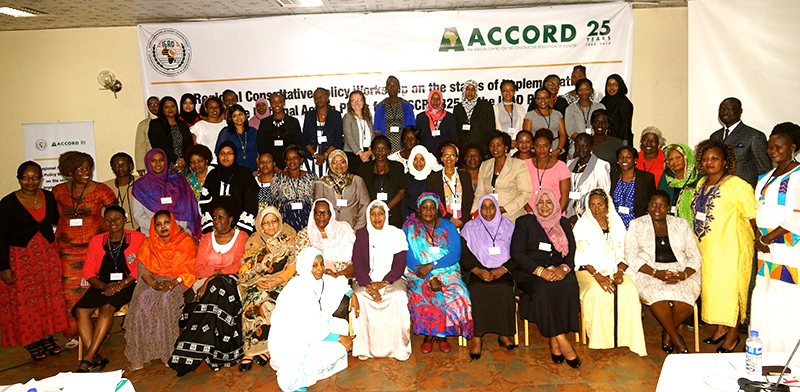07-12-2017, Kampala (Uganda): The Intergovernmental Authority on Development (IGAD) this morning opened the Regional Policy Consultative Workshop on the Implementation of the United Nations Security Council Resolutions (UNSCR) related to women in peace in partnership with the South Africa based African Centre for the Constructive Resolution of Disputes (ACCORD) in Kampala.
The two-day workshop seeks to assess the status and progress made by IGAD Member States in implementing their respective National Action Plans for UNSCR 1325 and to create a platform for experience sharing and consultations regarding the said National Actions Plans. It is further aimed at gauging the level of women’s participation in peace processes in IGAD region and at recommending ways and means of ensuring gender balance in this respect.
Female participants engaged in women’s empowerment activities at various ministries and institutions of Member States, Members of Parliament, as well as members from civil society organizations will be exploring, among others, opportunities for collaborative development of national capacities for women participation in peace and enable development implementation of action plans on UNSCR 1325 and 1820.
Dr Aleu Garang, Coordinator of the Mediation Support Unit (MSU) at IGAD speaking for the Executive Secretary, in his welcoming remarks recalled the establishment of the IGAD Roster of Mediators which requires a minimum of one third women representation as an instance of IGAD commitment to women’s empowerment in the sphere of peace and security among others. He also shared the close collaboration between the IGAD Gender Desk and the IGAD MSU to showcase how high the gender question is on the IGAD agenda.
Ms Irene Limo, Peacemaking Unit Coordinator-the African Centre for the Constructive Resolution of Disputes (ACCORD), identified “the slow implementation of laws, policies and programmes” as one of the factors of persistent gender inequalities despite “a substantial increase in commitments to gender mainstreaming in peace and security”. She recognized that “tangible results towards the Women, Peace and Security Agenda in Africa” were recorded. “We need to safeguard these gains so far made by documenting the capacities and experiences of women and the impact of these experiences and engagement in peace processes”, she said.
The Crisis Management Initiative, a Finnish non-governmental organisation which is a partner of IGAD MSU and a key invitee to the workshop, expressed their willingness to further collaborate with IGAD and ACCORD as they all share inclusion as a core value and a central priority area in programming.
The workshop is financially supported by the Government of the Kingdom of Sweden.
ஜ۩END۩ஜ
